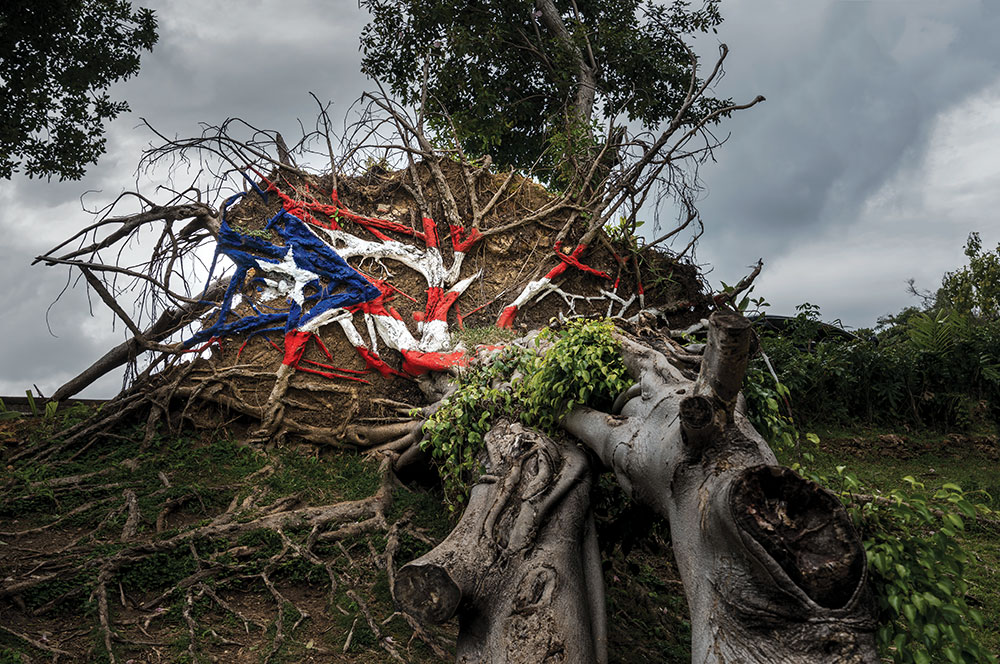 It’s been two years since Maria slammed into Puerto Rico as a Category 4 hurricane, the 10th strongest Atlantic hurricane on record.
It’s been two years since Maria slammed into Puerto Rico as a Category 4 hurricane, the 10th strongest Atlantic hurricane on record.
Maria destroyed roughly 80 percent of Puerto Rico’s agricultural industry, killed nearly 3,000 people, and wiped out electricity to the majority of the island’s almost 1.6 million customers. Schools closed; hospitals lacked the resources needed to treat the sick and injured.
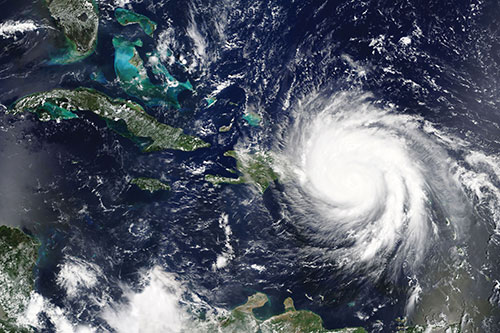 Islanders continue to struggle to rebuild their lives, their communities and their country.
Islanders continue to struggle to rebuild their lives, their communities and their country.
Last summer, several FGCU professors and students journeyed to Puerto Rico to learn firsthand about the island’s challenges and lend a helping hand. Three more FGCU professors conducted a survey of members of the Puerto Rican diaspora here in Southwest Florida. What follows is a look into their collective passion, their commitment and the work they have done, and continue to do, for our island neighbors.
Students see Puerto Rico’s journey back through study abroad course that offers insight into disaster relief efforts
Recovery as seen through a social work lens
In the summer of 2019, Lirio Negroni, associate professor of social work, and Tom Felke, associate professor and chair of social work, and eight FGCU students traveled to Puerto Rico as part of the elective course, “Social work practice with Latinos/as coping with the impact of natural disasters.”
Their objective was two-fold: to explore contemporary issues and needs of families and communities dealing with the impact of hurricanes Irma and Maria; and to use the insights gained to positively impact their work with Latinos/as in Southwest Florida. The trip was a partnership with the University of Connecticut School of Social Work and the University of Puerto Rico Beatriz Lasalle School of Social Work.
Research trips of this nature typically are open only to graduate students. Negroni and Felke, however, welcomed eight social work undergraduates, all at the end of their junior year, and each of whom performed admirably. “Our students are ethical, responsible, and committed,” Negroni said, “and interested in personal and professional growth.”
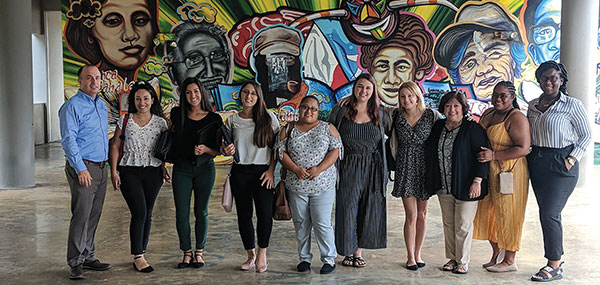
A brief overview of their journey can’t begin to capture the depth of experiences shared by the students who met with professionals and community leaders, visited various agencies and interacted with the local people. The students learned about
Puerto Rican history, culture, ecosystems and colonialism; attended social work practice conferences; learned about the social work response in the aftermath of Hurricane Maria – and that’s only for starters.
One of these many meaningful experiences involved a one-day service project in the central mountain municipality of Orocovis at Casa Solidaria (Solidarity House) that has been helping with housing recovery post Hurricane Maria. This is a community where practically all homes were destroyed.
“Solidarity House focuses on agricultural capabilities,” said Hannah Arteaga. “They aim to make communities aware of how to grow their own crops, so they are not dependent on spending money elsewhere and, also, to teach the youth of the importance of agriculture.
“There were many tasks including gardening, and clearing and creating pathways. I devoted most of my time to pulling weeds around the crops and tying strings around branches to help crops grow straight up rather than to fall when they reached a certain height. I also raked up leaves and trash.”
It was, perhaps, the day of service that brought together all the elements of the journey, in an academic, social and practical sense. “To be able to go on a study-abroad trip and not only gain so much perspective and knowledge, but also to give back and contribute is what made this day of service so special,” said Arteaga.
Negroni further pointed to the students’ opportunity to observe the differences in social work as practiced in Puerto Rico vs. in the mainland United States. “In Puerto Rico, students saw first-hand how to work with communities and critically evaluate the impact of social policies. As a result, these students have come back with ideas of how they might better work with Latinos/as here in Florida.”
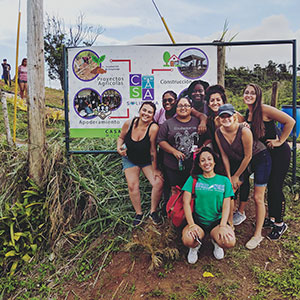
Maria Jimenez-Sebastian would agree: “I believe the knowledge and experience I gained from this trip will help me in my future career. When working with Puerto Rican clients here, I will be able to understand their background and, more importantly, their culture.”
Exposure to the big picture also made a lasting impression on Samantha Ackerson, who experienced macro social work, or large-scale advocacy and policy practice, first-hand for the first time. Prior to this, Ackerson’s attention was focused more on micro social work, or practice with individuals, families and groups. “This trip enhanced my understanding of how important macro social work is,” she said. “I had the textbook’s understanding, just not the first-hand experience. Though I plan to pursue a career in micro social work, I will keep tabs on, and be more active in, macro social work.”
Summarizing her experience, Ackerson shared a well-known parable, but with a twist. “There is the phrase, ‘If you give a man a fish, he will eat for a day. If you teach a man to fish, he will eat for a lifetime,’” she said. “A professor from the University of Puerto Rico challenged this phrase and explained to us that its meaning is way deeper than that. We must ask the ‘social questions’: ‘Where are the fish? Do the people want fish? What if there are no fish? Why are there no fish?’
“By thinking critically about circumstances, we will help our clients more.”
After losing so much, many people left the island. Others stayed, determined to rebuild and recover. An interdisciplinary team of professors and their students wanted to capture their stories. The result: Voices Boricuas.
Talking it out in the aftermath of pain and suffering
In light of the criticism of the government’s anemic response in the aftermath of Hurricane Maria, the resilience of the Puerto Rican people is described as epic – their tremendous courage in the midst of unthinkable devastation; families and individuals somehow finding the strength to carry on; strangers helping strangers; entire communities tackling the cleanup and rebuilding together. But that’s only a fraction of the story.
Jon Braddy, assistant professor of communication and philosophy; Marta Ramos, assistant professor of language and literature; and Win Everham, professor of ecology and environmental studies, together with six of their students, traveled to Puerto Rico to assess the devastation of Hurricane Maria, the efforts to rebuild lives, homes and communities, and the resilience of the islanders.
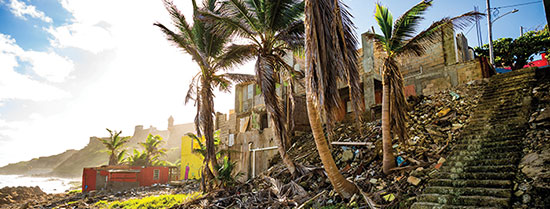
In the end, the students’ experiences together with face-to-face interviews with islanders – some prearranged and some spontaneous – would be woven together into a documentary, “Voices Boricuas,” which the team will share with the FGCU community and region as a way to bring continued awareness and understanding of Puerto Rico’s ongoing challenges.
Paola Reyes-Serrano said the intensely personal documentary will include an exploration “of the relationship between the Puerto Ricans who left the island and the Puerto Ricans who stayed after Hurricane Maria.” Though their challenges differ, the strength of their heritage binds them together and is woven into the very fabric of who they are to each other and to their homeland.
“Voices Boricuas” is an interdisciplinary project. Three teams of three – one professor and two students – investigated not only how islanders cope with unimaginable challenges, but also explored initiatives that might alleviate some of the difficulties inherent in the rebuilding process. Gunnar Gibson, (’17, Communication), joined the team as documentary director. “Gunnar added a modern visual lens to our academic research,” Braddy said. “Edgy, fresh and crisp – yet remaining true to the moment.”
Indeed, the challenges are overwhelming. “How do people recover from the worst hurricane ever,” asked Braddy, who, with his team, narrowed down economic recovery as one of their prime areas of research. New types of tourism for Puerto Rico seemed a good place to start. What bubbled up was Puerto Rico’s prior brush with marketing “extraterrestrial” tourism. And while this may seem farfetched to us on the U.S. mainland, the mythology surrounding aliens and UFOs is alive and well in Puerto Rico.
“Could this be the new Roswell?” asked Braddy and his team, referring to the widely held conspiracy theory that a UFO landed in Roswell, New Mexico back in 1947. “A lot of Puerto Ricans are believers,” Braddy said, “from mayors to tourism professionals, fishermen … Could Puerto Ricans capitalize on the mythology embedded in the island? Could this mythology spawn an industry?”
In the meantime, Ramos and her team focused on learning how the Puerto Ricans who opted to remain on the island following Maria felt about those who chose to relocate to the United States.
Reyes-Serrano approached this subject with a unique perspective. Brought up in Puerto Rico, she moved to the U.S. at age 21 in the aftermath of Hurricane Maria. “For me, ‘Voices Boricuas’ was personal,” she said. “Being able to go back and help so that the voices of my people are heard was life changing … this opportunity opened my eyes and created a path for me to serve Puerto Rico, little by little.”
The investigation of the relationship between the Puerto Ricans who left the island and those who stayed was of particular interest to Reyes-Serrano. “We achieved our purpose by interviewing locals and visiting some tourism places on the island. And now we plan to continue our work by interviewing Puerto Ricans in Florida, specifically in our community.”
Everham and his team took a different approach, looking at what the future of Puerto Rico could be in terms of sustainability.
Lina Ramirez (’19, Environmental Studies and Communication) explained: “We were looking at building with nature as opposed to against nature,” she said. “We asked interviewees what kind of sustainable practice would work well on the island? What does the future of Puerto Rico look like to them?
“We tried to be intentional in our conversation, listen and be engaged. Community members were telling us their truths and their perspectives.” Knowing that many more isolated communities do not have access to fresh food, the team discussed farm-to-table as not only a sustainable practice, but also a necessity.
The feeling of those Puerto Ricans who opted to stay on the island vs. those who left was revealing – overwhelming guilt vs. feelings of abandonment. But even then, Ramirez pointed out that islanders who stayed said that “because of those who left and who talk about their island communities, smaller towns are benefitting from more tourists.”
Life changed dramatically after the hurricane, and again when some survivors moved to the mainland. While they left some problems behind, the discovered new ones they hadn’t anticipated.
Starting over in the Puerto Rican diaspora
Hasan Aydin, Tunde Szecsi and Debra Giambo, professors in the College of Education, opted to pursue research locally, with the goal of positively impacting members of the Puerto Rican diaspora, regionally. To that end, they conducted a qualitative study that focused on collecting and analyzing the oral histories of a select number of Puerto Rican university students and families with children who relocated to Southwest Florida in the aftermath of Hurricane Maria.
What were the experiences of these displaced islanders? From a distance, we can easily imagine that fear of the unknown, concern for the children, and anxiety over language and cultural barriers loomed large. But our imagination pales in comparison to the challenges actually faced by those Puerto Ricans who chose mainland America and the hope of the unknown vs. the devastation of the known.
The numbers are one thing: approximately 50,000 Puerto Ricans moved to Florida after Hurricane Maria, including approximately 12,000 students who transferred to Florida schools. The human emotional, psychological and physical toll is yet another: “The purpose of the study,” Aydin said, “is to document the experiences of displaced students and families. Our goal is to offer constructive recommendations to schools, colleges and community agencies regarding effective integration after the trauma.”
In gathering their data, interviewers asked interviewees to respond to 15 open-ended questions dealing with their experiences during and after Hurricane Maria; their decision to relocate to Southwest Florida; and their experiences once here.
The analysis of the survey data gathered by the team identified five major themes: trauma immediately following the hurricane; limited formalized assistance in Southwest Florida; families’ self-reliance; the need for mental health services for children; and challenges associated with language barriers.
For example, Aydin said, “Parents are concerned with how to go about finding a job, a house, a school for their children. The children might be facing bullying in the classroom. They need counseling; teachers need training.”
Armed with the knowledge as shared by interviewees, the FGCU team made the following recommendations, which will be shared with educational and community agencies to help displaced students and families effectively integrate in their new home:
- For the university to provide support for students in similar situations (e.g., orientation, assign a point person or identify an office for when issues and needs arise, training for faculty and staff);
- For structured support by local government and community agencies to include help finding housing, jobs, food, socialization opportunities;
- For psychological counseling for students in school;
- For training for public school teachers so support can be provided, including working with native students so bullying can be avoided;
- For sufficient support in English language for both university and school-aged children.
The goal is that these recommendations will be integrated into the process by which community leaders and educators welcome members of the Puerto Rican diaspora into life in Southwest Florida.[/vc_column_text][vc_column_text]Hurricane Maria survivors get helping hand from FGCU
Beginning in the spring 2018 semester, FGCU waived out-of-state tuition for each of three semesters for students who moved to Southwest Florida in the aftermath of Hurricane Maria.
“These are challenging times for millions of people striving to get back on their feet after their communities were shattered,” said FGCU President Mike Martin. “With educational institutions unable to operate as usual, those trying to better their lives through learning could easily have their dreams derailed. As partners in higher education, we believe it’s our duty to provide this avenue in the hope that it helps students stay on the path to success while their communities heal.”

Junior Jose Rivera relocated to Southwest Florida in the aftermath of Hurricane Maria and was able to enroll in FGCU thanks, in large part, to the tuition waiver offered to displaced Puerto Ricans. “Once I heard I would not have to pay out-of-state tuition,” Rivera said, “it was the biggest thing for me. FGCU is incredible. Students at the university have so many more opportunities here.”
Junior Paola Reyes-Serrano, lived in Puerto Rico for 21 years. She, too, moved to Southwest Florida in the aftermath of Hurricane Maria. “I was the first Puerto Rican to approach FGCU to ask for a transfer,” she said. “However, since my parents already lived in the U.S. prior to the event, I was already eligible for a tuition waiver.” Reyes-Serrano’s original plan was to return to Puerto Rico, but after talking with her parents, she decided to enroll in FGCU.
[/vc_column_text]“I couldn’t have made a better decision,” she said. “FGCU has given me so much.”